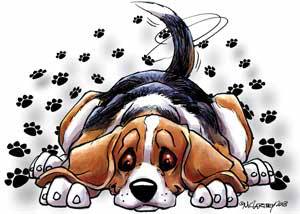
The temperament of a Beagle is notoriously friendly and gentle. They are even-tempered dogs, neither too aggressive nor too timid. They have medium energy and are of a smaller build. Other Beagles traits are “happy-go-lucky,” and loyal. They are also known for their soulful expressions.
The breed was meant to work together in packs, and consequently, Beagles get along very well with other dogs and prefer companionship. Beagles will look to their owners and families as their new “pack.” For this reason, among others, they make terrific family dogs as they love to be surrounded by energy, love, and attention. Beagles love any opportunity to use their noses, which is why outdoor time is so important.
Beagles make poor guard dogs because of their friendly dispositions, and they can easily be won over by people even if they are initially standoffish. However, they make good watchdogs because of their boisterous voices and howling.
Because Beagles were bred for a long chase on a hunt, they are quite determined dogs. This characteristic can be difficult to deal with when your Beagle ignores you in favour of something that he has set his mind to. Furthermore, this can make a Beagle hard to train. Similar to some other hounds, Beagles can have select deafness. it can make it hard for an owner to try to communicate with their dogs, especially when calling them to come. However, this select deafness really does translate to selective hearing, so you can never be quite sure if your dog is ignoring you or not. For that reason, training your dog at a young age to gain respect is important.
Beagles get along very well with other dogs. But, of course, with any type of dog, they should be socialised with other dogs from a young age to learn good characteristics of sharing and playing.
Key Beagle personality traits are loving, curious, and friendly. It is very uncommon for a Beagle’s personality to be aggressive or violent. However, they have a boisterous voice and are known for their deep howls. A good way to combat difficult behaviour is by making sure your Beagle is getting enough physical activity and attention.
One downside to Beagles being pack animals is that they can be prone to canine separation anxiety. This condition can have some unpleasant effects as the Beagle will then likely destroy things around them during their bout of anxiety.

WHAT ARE RIDGEBACKS LIKE?
Ridgebacks are from Southern Africa. They have been developed by crossing lots of breeds, mainly gundogs, terriers, hounds, bullmastiff types and there are indigenous African hunting dogs in the mix too! The Ridgeback is not an attacking breed; it is bred to track game then keep it at bay and also to be a loyal companion. They are not guard dogs as such, but will keep a very watchful and protective eye on the family they love.
Ridgebacks are bred for endurance, stamina, should be light on their feet and extremely agile. Being a hunting breed they are developed to think for themselves, they will chase anything that runs away, which could cause problems. It is important that time is made available to give them the amount of good exercise they need. Without the stimulation of a daily run, you may find you have a very bored hound on your hands, and a bored ridgeback can be a destructive ridgeback.
These dogs are big, strong in mind and body. If your ridgeback does not respect your authority you may be faced with a problem! Earning a Ridgeback's respect should be a first priority. They can test you to the limits, so you must be prepared to out think your dog. Never, ever lose your temper, they are not servants and although they are more trainable than most hound breeds, you won't ever get the instant submission you see in working or gundog breeds, like the collie or Labrador. Once you have gained a Rhodesian Ridgeback's respect you will have a life long devoted and entertaining companion.
With strangers ridgebacks can be standoffish. Even after a proper introduction a friendship cannot be rushed, but once given, it is rarely forgotten. Natural suspicion should not be confused with nervousness. They are playful, love to romp, chase anybody and anything that joins in, they can play very rough, shoulder barging is a speciality. This can be off-putting to other dog owners who may think your dog is aggressive when all he wants to do is play.